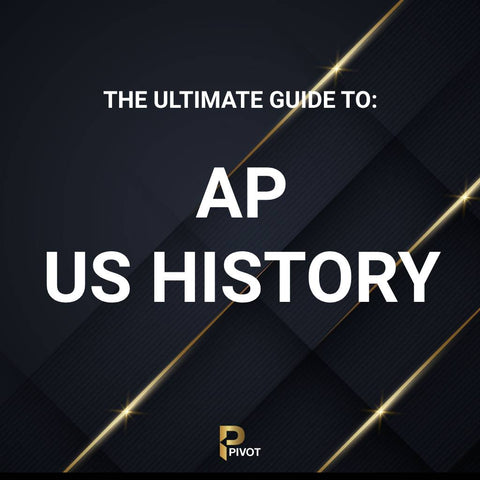Deciding whether to take Advanced Placement (AP) courses can be a pivotal choice for high school students aiming for prestigious colleges and universities. Among these, AP United States History (APUSH) stands out as a popular yet daunting option.
This course not only dives deep into the rich tapestry of American history but also challenges students with its rigorous assessment methods. In this blog, we will explore various aspects of APUSH to determine its difficulty level compared to other AP courses. We'll look at what the course covers, the skills it demands, and discuss who might benefit most from taking it.
Whether you're a student trying to plan your course load or a parent assisting your child in making informed decisions, understanding the complexities of APUSH is crucial for preparing effectively. Let’s decode the myths and facts about this challenging course to see if it’s the right fit for you.
What Is AP United States History?
AP United States History, commonly referred to as APUSH, is an advanced placement course offered by the College Board that allows high school students to tackle college-level studies in American history. This course is designed to provide a comprehensive overview of the country’s history, from pre-Columbian times to the present day. The aim is to prepare students for the AP exam that could potentially earn them college credit and provide a robust foundation for further study in history and related disciplines.
What Does AP United States History Cover?
APUSH covers a broad spectrum of American history topics across several eras:
- Exploration and Colonization: This period focuses on the early exploration of the Americas, the establishment of colonies, and the interactions between indigenous peoples and European settlers.
- Revolution and Nation Building: Students will study the causes and effects of the American Revolution, the formulation of the U.S. Constitution, and the challenges the young nation faced.
- Expansion and Conflict: This era includes the expansion westward, the conflicts with Native Americans, the Mexican-American War, and the internal tensions leading to the Civil War.
- Civil War and Reconstruction: Detailed coverage of the war’s strategic, political, and social aspects, followed by the complex Reconstruction period.
- Industrialization and Reform: Analysis of the Industrial Revolution in America, significant economic and social reforms, and the rise of political movements.
- Modern America: The course covers the major political, cultural, and economic developments of the 20th and early 21st centuries, including world wars, the civil rights movement, and contemporary issues.
Through these topics, APUSH students are expected to develop a critical understanding of historical events, figures, and trends. The course emphasizes the development of analytical skills, critical thinking, and the ability to assess historical evidence, providing a rigorous preparation that challenges even the brightest students.

How Hard Is AP United States History?
AP United States History (APUSH) is often cited as one of the more challenging AP courses offered by high schools. The difficulty of APUSH can vary significantly from one student to another, depending on their background in history, their academic skills, and how they adapt to the course's demands. This section explores the rigorous nature of APUSH and how it stacks up against other AP classes.
How Does APUSH Compare to Other AP Classes?
APUSH is unique in its comprehensive coverage of American history, requiring a blend of memorization, critical thinking, and analytical writing skills. Here’s how it compares to other popular AP courses:
- Compared to AP World History and AP European History: APUSH is often considered tougher than AP European History but on par with or slightly less demanding than AP World History. The latter covers a broader scope of history, making the amount of content slightly more overwhelming. However, the depth of detail required in APUSH can be more intense due to its focus on one nation’s historical trajectory.
- Compared to AP Sciences like Biology and Chemistry: While AP sciences are heavy on memorization and require strong problem-solving skills, APUSH demands extensive reading and writing. The type of difficulty is different; science exams often test understanding through practical questions and experiments, whereas APUSH tests depth of knowledge and the ability to argue historically.
- Compared to AP Math Courses: Courses like AP Calculus and AP Statistics involve logical reasoning and numerical problems, which are starkly different from the content-based and essay-oriented APUSH exam. Students who excel in math might find the memorization and writing focus of APUSH to be a unique challenge.
- Compared to AP English: Both AP English Language and Literature courses prepare students well for APUSH’s heavy emphasis on writing and critical analysis. However, APUSH also requires a substantial commitment to memorizing factual information, which is less central in English classes.
APUSH's difficulty lies in the balance it requires between remembering detailed historical facts and utilizing those details effectively in analytical essays and critical discussions. For students who are well-prepared and interested in history, APUSH can be a rewarding, though challenging, academic endeavor.
Factors Affecting AP United States History Difficulty
AP United States History (APUSH) is recognized for its rigorous curriculum, designed to challenge students and prepare them for college-level history courses. Several factors contribute to its reputation as one of the tougher AP classes. Understanding these factors can help students and parents gauge whether this course is a suitable challenge.
Extensive Content
APUSH covers a detailed and extensive timeline of American history from pre-Columbian times to the present. Students must not only memorize important dates, figures, and events but also understand the broader implications of these milestones in the context of American and global history.
The sheer volume of information can be overwhelming, making it imperative for students to develop effective study habits.
Analytical Thinking
Unlike courses that rely heavily on rote memorization, APUSH demands a high level of analytical thinking. Students need to analyze historical documents, interpret historical evidence, and construct well-reasoned arguments based on this analysis.
This requirement to connect disparate historical facts into a cohesive understanding adds a layer of complexity to the course.
Writing Skills
A significant portion of the APUSH exam consists of essay questions, including a document-based question (DBQ) and a long essay question. Effective writing skills are crucial, as students must be able to construct clear, argumentative essays under time constraints.
These essays test students’ ability to use historical evidence in support of their arguments, demanding precision, clarity, and organization in writing.
Fast-Paced Learning
APUSH is often taught at a brisk pace, requiring students to absorb a large amount of information quickly. Classes frequently move from one major topic to the next without much downtime, meaning students must be able to keep up with the pace and retain information from earlier in the course while adding new knowledge.
This fast-paced learning environment can be particularly challenging for students who are not accustomed to such a rigorous academic schedule.
Together, these factors make AP United States History a demanding course that tests a wide range of skills. However, for motivated students who are prepared to commit to the workload, APUSH offers an invaluable opportunity to develop college-level analytical abilities and writing skills.
Is AP United States History Worth Taking?
Given its rigorous nature, students often wonder if taking AP United States History (APUSH) is worth the effort. The value of enrolling in APUSH depends on several factors, including a student’s academic goals, interests, and readiness for college-level coursework. Below, we discuss who might benefit from this course and how it is perceived by colleges.
Who Should Take APUSH?
APUSH is ideal for students who:
- Have a Strong Interest in History: Students who are fascinated by historical events, figures, and trends will find APUSH engaging and intellectually stimulating.
- Plan to Pursue a Degree in History or Related Fields: For students considering a major in history, political science, anthropology, or related fields in college, APUSH provides a solid foundation and a head start on college coursework.
- Are Looking for a Challenge: Students who have excelled in previous social studies courses and are seeking to challenge themselves academically may find APUSH a rewarding endeavor.
- Possess Strong Reading and Writing Skills: Since the course demands significant reading and writing, students who are strong in these areas will be better positioned to succeed.
- Want to Develop Critical Thinking and Analytical Skills: APUSH encourages students to think critically about historical data and develop analytical skills that are applicable across various academic disciplines.
Do Colleges Care About AP U.S. History?
Colleges and universities often view AP courses favorably as they indicate a student’s ability to handle challenging coursework, which is indicative of college readiness. Specifically, APUSH can be particularly beneficial for students who:
- Are Applying to Top-tier Schools: Competitive colleges look for students who take rigorous AP courses, and APUSH is often recognized as one of the more challenging AP classes available.
- Want to Stand Out in the College Admissions Process: Successfully navigating a demanding course like APUSH and performing well on the AP exam demonstrates a student’s commitment and capability, traits that are highly valued by admissions officers.
- Seek to Earn College Credits: Many colleges offer credit for high scores on the APUSH exam, which can allow students to bypass introductory courses in college, saving time and tuition costs.
In conclusion, while AP United States History is undoubtedly challenging, it is also a course that can greatly enhance a student’s academic profile and preparedness for college. It provides rigorous training in critical thinking, analytical writing, and a deep understanding of American history, all of which are valuable skills in college and beyond.

Frequently Asked Questions
AP United States History (APUSH) raises many questions for students as they decide whether to take this challenging course. Here are some of the most common queries answered to help you make an informed decision.
Does APUSH Require a Lot of Memorization?
Yes, APUSH does require significant memorization. Students need to remember important dates, key figures, critical events, and much more. The scope of the course is vast, covering several centuries of American history.
Memorization aids in creating a framework on which deeper analytical skills can be built, which are crucial for tackling the essays and critical thinking questions on the exam.
Is AP U.S. History the Hardest AP Course?
Whether APUSH is the hardest AP course can depend on a student's personal strengths and interests. However, it is widely considered one of the more challenging AP courses due to its vast amount of content and the critical thinking and detailed writing skills required.
Students often compare its difficulty to that of AP Biology or AP Chemistry, though APUSH involves more writing and analytical thinking compared to the quantitative nature of the science courses.
Which AP History Is the Easiest?
The perceived difficulty of AP history courses can vary widely among students, but AP European History is often considered slightly easier than APUSH by some, due to its narrower scope of content (focusing primarily on European events) and slightly less dense exam format.
However, "easier" is subjective and can depend heavily on a student's personal interests and academic strengths. AP World History, by contrast, is often considered the most challenging because of its broad temporal and geographical scope.
Conclusion: Is AP United States History Hard?
The question of whether AP United States History (APUSH) is hard can be answered with a definitive yes—it is considered one of the more challenging AP courses available. However, the difficulty of the course should not deter motivated students who are passionate about history and eager to deepen their understanding of the forces that have shaped the United States.
APUSH requires a blend of extensive content memorization, strong analytical thinking, proficient writing skills, and the ability to learn at a fast pace. This combination makes it demanding, but also incredibly rewarding for the right student. It's a course that can significantly enhance college applications, providing students demonstrate the capability to handle challenging coursework and excel.
For those wondering if APUSH is worth the effort, it often is, particularly for students who:
- Enjoy history and are committed to understanding it deeply.
- Wish to develop critical thinking and analytical skills that will benefit them across all areas of study.
- Are looking to stand out in the competitive process of college admissions.
Ultimately, success in APUSH depends on personal commitment, intellectual curiosity, and a willingness to engage with the material thoroughly and consistently. With the right approach and preparation, APUSH can be more than just a challenging class—it can be a profound educational experience that offers valuable insights into the past and present of the United States.
Looking for more information about AP US History?
Download our comprehensive class guide by clicking the thumbnail below, or visit our AP US History page to learn more about tutoring support.


